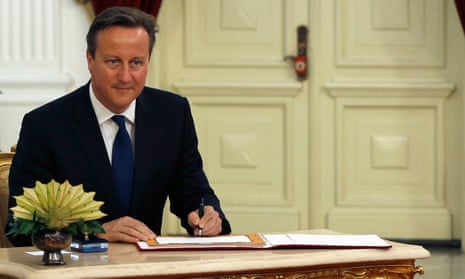David Cameron has rejected suggestions that the Scottish nationalists should be entitled to hold a second independence referendum during this parliament.
He was speaking after the former Scottish first minister, Alex Salmond, said a second referendum was inevitable and would be required if the government did not change course on public spending, further devolution to Scotland, or if Britain decided to leave the EU.
The prime minister, speaking on a flight to Indonesia ahead of a tour of south-east Asia, brushed aside Salmond’s comment.
Referring to the 2014 referendum, he said: “I think it is important that a referendum is legal and properly constituted and that is what we had, and it was decisive, so I do not see the need for another one.”
Under current UK law, the Scottish National party would need the permission of the UK parliament to stage a referendum and for it to be binding.
But there have been suggestions the SNP will seek a mandate for a second referendum in next year’s elections for the Scottish parliament, and then demand Cameron respect the will of the Scottish people.
It has also been suggested that Scotland’s government could stage a referendum in defiance of London and demand secession. Catalonian nationalists in Spain had planned such an indicative referendum but backed down.
Cameron rejected such a stance saying: “I take a very clear approach that these things must be legitimate and that is my view.”
He ruled out a referendum in this parliament. And his aides point out that after the last referendum, the SNP said the issue of a separate state had been ruled out for a generation. It had also said the idea of a “neverendum”, in which the issue is never off the table, was ultimately destabilising for the Scottish economy.
But the Conservative party is aware that the SNP is looking for a confrontation over a referendum, as well as doing all it can to antagonise Scottish Tories by threatening to vote on English-only issues, including revisions to the foxhunting laws in England.
It is not clear whether the government’s revised plans for English MPs to vote on England-only issues will remove Scottish MPs’ right to intervene in lawmaking.
Salmond, speaking on the Andrew Marr Show on Sunday, said the timing of a referendum rests with his successor, Nicola Sturgeon. He said: “I can see three issues which are moving things towards a second referendum on a timescale yet to be determined. One is the refusal to deliver the vow. The vow was about home rule, devo [devoution] to the max, ‘near federalism’, to quote Gordon Brown. That has not been delivered as yet, at least in the Scotland bill, so that’s an issue.
“The second issue is one that’s been cast up quite a lot and that’s the European issue. If you had a situation and circumstance where Scotland voted to stay in the European Union in the referendum but was dragged out on the votes of the people of England then that would be a material change of circumstance and the third thing emerging, of course, comes out of the budget and the welfare bill, which is austerity.
“Instead of getting devo to the max, we’re getting austerity to the max, and that divergent view of what’s right in social terms between Scotland and England is another issue which is moving things towards another referendum.”
All three issues raised by Salmond are likely to be current in this parliament.
Responding to Cameron, an SNP spokesperson said: “The SNP are not planning another referendum, but equally it is not in the gift of any politician or party to rule it out indefinitely. The timing of any future referendum is a matter for the people of Scotland to decide – and not for a Tory prime minister to dictate.”
Humza Yousaf, the Scottish minister for Europe and international development tweeted on Monday night: “The people have the right to determine their own future, not a Tory PM who only has one MP in Scotland.”
The people have the right to determine their own future, not a Tory PM who only has one MP in Scotland https://t.co/soCLpANkQO
— Humza Yousaf (@HumzaYousaf) July 27, 2015

Comments (…)
Sign in or create your Guardian account to join the discussion